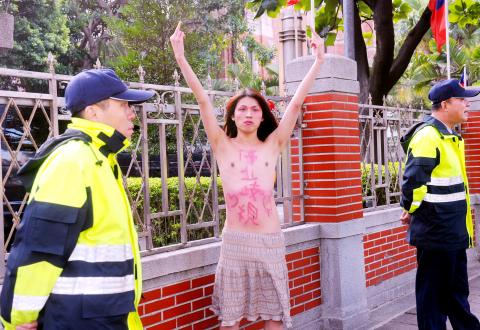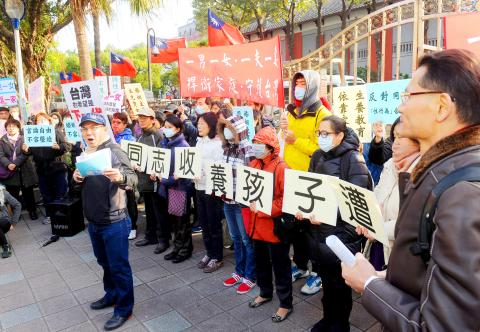A proposed amendment to the Civil Code aimed at legalizing same-sex marriage was stalled at the legislature yesterday, after it met with staunch opposition from the Ministry of Justice and Chinese Nationalist Party (KMT) legislators.
Since the legislature’s Judiciary Committee failed to hold a vote on the amendment, it will remain in limbo until the next legislative session, which is due to begin in February.
While the bill was debated, opposing rallies clashed over the issue outside the Legislative Yuan in Taipei.

Photo: CNA
Lesbian, gay, bisexual and transgender (LGBT) advocacy groups expressed their disappointment over the results, saying that many of the opposing comments from the ministry and KMT legislators seemed to “take us back in time to an unenlightened era, or a bygone century.”
The bill, dubbed the Marriage Equality Amendment, proposes to replace terms in the Civil Code denoting heterosexual couples with neutralized ones, for example replacing “husband and wife” with “couple,” which would therefore effectively legalize same-sex marriage.
Deputy Minister of Justice Chen Ming-tang (陳明堂) listed four main reasons for the ministry’s opposition to the amendment, saying that its passage would impact current marriage institutions, including population policies and inheritance principles, and introduce changes to too many laws; that it lacks social consensus and support; that it has met “strong opposition” at public hearings; and that the rights of gays and lesbians can be protected through legal reforms on issues such as medical visitation rights or taxation, without making “hasty” changes to marriage institutions.

Photo: CNA
Chen said legalizing same-sex marriage is unsuitable for Taiwan at the moment, since it goes against the nation’s “views on interpersonal ethics and morality.”
He denied allegations that the government discriminates against homosexuals, saying that the ministry would soon put forward a proposal to protect the rights of gays and lesbians “through successive phases,” adding that he was more open to supporting individual legislation than altering the Civil Code.
Democratic Progressive Party (DPP) Legislator Cheng Li-chiun (鄭麗君) compared Chen’s suggestions for separate legislation to racial segregation, saying that this would imply discrimination, not guard against it.
Cheng then asked the deputy minister what he thought about a recent music video by pop diva Jolin Tsai (蔡衣林), which features an elderly woman who is unable to sign medical papers for her partner.
Chen said that such issues could be solved through reforms conducted by the Ministry of Health and Welfare.
DPP Legislator Tuan Yi-kang (段宜康) blasted the justice ministry over its concerns that legalizing gay marriage would lead to a population decrease and asked Chen if the ministry should, by the same token, forbid heterosexual couples who are unable to bear children from getting married.
However, KMT Legislator Liao Cheng-ching (廖正井) supported Chen’s views, saying he was afraid that same-sex marriage would exacerbate problems in Taiwan’s aging society and that there would be fewer young people left to take care of senior citizens.
Liao’s remarks raised some controversy, but not as much as those made by fellow KMT Legislator Lu Hsueh-chang (呂學樟), who said he was worried that the act’s passage might encourage “startling” behavior, such as polygamy and bestiality.
Cheng responded by saying she is unsure about who is more likely to engage in bestiality: gay or straight people.
While lawmakers were gridlocked inside the Legislative Yuan, more than 100 members of the anti-gay marriage group Alliance of Religious Groups for the Love of Families Taiwan gathered outside yesterday morning, calling on legislators to block the amendment.
“Under the influence of popular culture, homosexuality might become something of a fad, like the trend of holding barbecues for the Mid-Autumn Festival,” said one member of the group, who referred to herself as “Hsiaowei’s Mom (小偉媽媽).”
The protest was interrupted by gay rights advocates several times, including by a group of about a dozen activists who picketed the group and chanted slogans nearby, shouting: “Discrimination is not [protected by] free speech.”
A transgender activist known as Miss Wu (吳小姐), who was born male, but identifies as a transgender woman, stormed through the protesting group members while wearing a skirt and nothing but red paint smeared on her upper torso. She remained mostly silent, but made obscene gestures at the anti-gay marriage protesters.
As KMT legislators currently outnumber their DPP counterparts in the Judiciary Committee nine to four, LGBT advocates speculate that the committee’s convener, DPP Legislator Yu Mei-nu (尤美女) — a leading proponent of many gender rights issues — may have strategically stalled the vote.
Taiwan Alliance to Promote Civil Partnership Rights director Victoria Hsu (許秀雯) said that although many DPP lawmakers are staunch supporters of marriage equality, several DPP committee members failed to show up for today’s meeting, while Tuan, Cheng and other vocal supporters of the amendment do not have the right to vote in the committee.
Hsu questioned if the DPP is placing enough importance on the issue, as it has yet to make a collective effort to promote same-sex marriage.
Taiwan Alliance to Promote Civil Partnership Rights secretary-general Chien Chih-chieh (簡至潔) said that given the legislature’s current composition — with the KMT commanding a majority — the amendment stands little chance of getting passed.
She added that she hopes the issue can be debated in the 2016 presidential and legislative elections, with input from third party contenders.

INVESTIGATION: The case is the latest instance of a DPP figure being implicated in an espionage network accused of allegedly leaking information to Chinese intelligence Democratic Progressive Party (DPP) member Ho Jen-chieh (何仁傑) was detained and held incommunicado yesterday on suspicion of spying for China during his tenure as assistant to then-minister of foreign affairs Joseph Wu (吳釗燮). The Taipei District Prosecutors’ Office said Ho was implicated during its investigation into alleged spying activities by former Presidential Office consultant Wu Shang-yu (吳尚雨). Prosecutors said there is reason to believe Ho breached the National Security Act (國家安全法) by leaking classified Ministry of Foreign Affairs information to Chinese intelligence. Following interrogation, prosecutors petitioned the Taipei District Court to detain Ho, citing concerns over potential collusion or tampering of evidence. The

‘FORM OF PROTEST’: The German Institute Taipei said it was ‘shocked’ to see Nazi symbolism used in connection with political aims as it condemned the incident Sung Chien-liang (宋建樑), who led efforts to recall Democratic Progressive Party (DPP) Legislator Lee Kun-cheng (李坤城), was released on bail of NT$80,000 yesterday amid an outcry over a Nazi armband he wore to questioning the night before. Sung arrived at the New Taipei City District Prosecutors’ Office for questioning in a recall petition forgery case on Tuesday night wearing a red armband bearing a swastika, carrying a copy of Adolf Hitler’s Mein Kampf and giving a Nazi salute. Sung left the building at 1:15am without the armband and apparently covering the book with a coat. This is a serious international scandal and Chinese

Seventy percent of middle and elementary schools now conduct English classes entirely in English, the Ministry of Education said, as it encourages schools nationwide to adopt this practice Minister of Education (MOE) Cheng Ying-yao (鄭英耀) is scheduled to present a report on the government’s bilingual education policy to the Legislative Yuan’s Education and Culture Committee today. The report would outline strategies aimed at expanding access to education, reducing regional disparities and improving talent cultivation. Implementation of bilingual education policies has varied across local governments, occasionally drawing public criticism. For example, some schools have required teachers of non-English subjects to pass English proficiency

TRADE: The premier pledged safeguards on ‘Made in Taiwan’ labeling, anti-dumping measures and stricter export controls to strengthen its position in trade talks Products labeled “made in Taiwan” must be genuinely made in Taiwan, Premier Cho Jung-tai (卓榮泰) said yesterday, vowing to enforce strict safeguards against “origin laundering” and initiate anti-dumping investigations to prevent China dumping its products in Taiwan. Cho made the remarks in a discussion session with representatives from industries in Kaohsiung. In response to the US government’s recent announcement of “reciprocal” tariffs on its trading partners, President William Lai (賴清德) and Cho last week began a series of consultations with industry leaders nationwide to gather feedback and address concerns. Taiwanese and US officials held a videoconference on Friday evening to discuss the